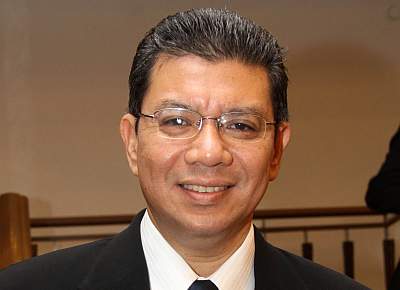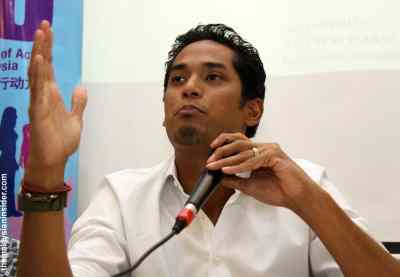Deputy Minister to rally Barisan MPs to #Stop114A
By A. Asohan August 13, 2012
- Deputy Higher Education Minister worried that amendment to Evidence Act would create culture of fear
- Section 114A also goes against Government’s reform and transformation agenda, he adds
 DEPUTY Minister of Higher Education Datuk Saifuddin Abdullah (pic) said he would rally fellow Members of Parliament (MPs) of the Barisan Nasional ruling coalition to call for a review of the recently-gazetted amendment to the Evidence Act 1950.
DEPUTY Minister of Higher Education Datuk Saifuddin Abdullah (pic) said he would rally fellow Members of Parliament (MPs) of the Barisan Nasional ruling coalition to call for a review of the recently-gazetted amendment to the Evidence Act 1950.
“I agree with (Umno Youth chief and Rembau MP) Khairy Jamaluddin’s concerns and call for a review,” Saifuddin told a forum discussion on Saturday (Aug 11) jointly organised by the Bar Council’s National Young Lawyers Committee, Malaysian Center for Constitutionalism and Human Rights (MCCHR) and the Center for Independent Journalism (CIJ).
Khairy had told reporters in June that he was against the new provisions in the Act that seemingly put the burden of proof on defendants, saying “I am uncomfortable with this” and that he had lobbied against it.
Despite public fears that the amendment would stifle freedom of expression and put a damper on the country’s burgeoning digital economy, Section 114A to the Evidence Act was gazetted by de facto Law Minister Mohamed Nazri Abdul Aziz and came into force on July 31.
Nazri had originally tabled the Bill in Parliament for its first reading on April 10, together with a raft of other new legislation. It was passed by the Dewan Rakyat on April 18 with barely a debate, having passed under the radar of most MPs.
Saifuddin told the forum that he wished there had been more discussion and debate on the legislation before it was brought into force.
“As an Umno card-carrying politician who supports Prime Minister Datuk Seri Najib Tun Razak’s transformation and reform agenda, I find the insertion of Section 114A to be problematic.
“First, people in Internet-related businesses might find it threatening and investors may become wary,” he said. “Second, it might affect the realm of academic freedom; it may affect how students and lecturers view discourse.”
“Third, I wonder if this isn’t going to create a culture of fear in the country, where everyone is worried that their websites, blogs or Facebook and Twitter accounts are always being watched or spied upon.
“Finally, as a Barisan guy who supports progressive, democratic reform – I take this is as a hiccup,” he added.
Under Section 114A, an Internet user is deemed the publisher of any online content unless proven otherwise. It also makes individuals and those who administer, operate or provide spaces for online community forums, blogging and hosting services, liable for content published through their services.
The presumption of guilt goes against a fundamental principle of justice, that of innocent until proven guilty, and disproportionately burdens the average person who may not have the resources to defend himself in court, said the CIJ, which has been spearheading civil society efforts to see the law revoked.
 “I am going to call Khairy (pic) and a few other Barisan MPs who also agree with us, and I think we need to send a clear message to our bosses that we think this law needs reviewing,” said Saifuddin.
“I am going to call Khairy (pic) and a few other Barisan MPs who also agree with us, and I think we need to send a clear message to our bosses that we think this law needs reviewing,” said Saifuddin.
“I think for the public good, we need to do away with Section 114A as it stands now,” he said.
Some fears unfounded?
The forum on Saturday also included Foong Cheng Leong, the lawyer and Kuala Lumpur Bar IT Committee co-chair who has been bringing the issue to light; as well as members of the Bar Faisal Moideen; K. Shanmuga; and Mahaletchumi Balakrishnan, who moderated.
Faisal in fact suggested that Section 114A does not presume “guilty until proven innocent” but just presumes you are the publisher – and this would only be one element in proving a case.
“We’re forgetting the fact that these are rebuttable presumptions -- it creates a presumption of fact in the sense that if the computer is yours, or the account is yours, the evidential onus is you to then say how the material got on to the website.
“These are presumptions of fact that under the law are derived from a basic fact – that you own the computer or account. Section 114A then deduces and makes the presumption that therefore you must have published it.
“The question then now becomes, that upon presumption of this, whether you are automatically guilty or liable insofar as civil action is concerned -- upon closer reading of 114A, this is not the case,” he told the forum.
“Presumption of guilt does not rise from Section 114A – it only shifts of the evidentiary burden on one fact, the fact of publication. The prosecution will still fail if other elements of the case are not enough to convict you,” he added.
Faisal explained that this shifting of the evidentiary burden to the defendant can be seen in a host of legislation, including trademark and drunk-driving laws in developed nations.
However, he agreed that the wording in the amendment currently is troubling and can be interpreted too widely, but was unsure whether it determines liability.
Shanmuga noted that the presumption of fact is present in many laws including Malaysia’s Dangerous Drug Act – where if you possess more than a certain amount of illicit drugs, you are presumed to be a drug pusher unless you can prove otherwise.
“In Section 114A, you are presumed to be the publisher unless you prove otherwise, and the wording here is troubling: It could mean that you have to prove that you did not publish it, or that you must prove who published it and that it wasn’t you.
“The law is very badly worded in this case,” he added.
The forum agreed the number of online defamation cases was increasing, and that were was a need to strike a balance between individual rights and public good, the right of a person whose reputation has been unfairly sullied and freedom of expression.
However, they also agreed on the whole that Section 114A was too blunt an instrument as it is currently worded.
Shanmuga went so far as to say that it doesn’t even address the issues it is supposed to address.
Law Minister Nazri, when tabling the Bill in April, said that the use of pseudonyms and anonymity by any party to commit cyber-crimes made it difficult for action to be taken against them.
“It is true that people have used the anonymity of the Internet to post truly objectionable material – racist screeds and incitements to violence among them – and to commit online fraud,” Shanmuga said.
“These are real problems, but what is wrong with this Bill is that it doesn’t address these abuses at all. How does a person whose account has been hacked to commit fraud be able to defend himself when he is being sued by everyone else?” he added.
He said that based on Saifuddin’s apprehensions and concerns, this law was rushed through.
“What would have been the harm in putting this out for public dialog and consultation with technical and legal experts, asking them for suggestions on how to address the above issues?” Shanmuga noted.
Saifuddin said that MPs and interested parties such as the forum organizers should work together on further consultations and dialogue with experts to present a viable alternative to tackle the issues Section 114A is supposed to address.
“Let’s be prepared to answer the question: If not Section 114A, what then?” he said.
Pictures courtesy of The Malaysian Insider
Related Stories:
Govt stealthily gazettes Evidence Act amendment, law is now in operation
Evidence Act: Aug 14 declared ‘Internet Blackout Day’
Evidence Act: An issue to be solved technically, not legally: MOL
Petition to stop controversial amendment handed to Govt (includes videos)
FB page, online petition begun against Evidence Act amendment
Evidence Act, censorship, control issues and other #facepalms


